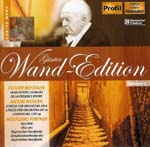Remembered primarily for recordings of core 19th century classics, Gunter Wand (1912-2002) was once best known in Germany as a new-music advocate. These 1960s Bavarian Radio recordings document his ability to get accurate, committed performances of some difficult and controversial 20th-century works, though the orchestra (like many in Germany at the time still in the process of wartime recovery) shows little of the tonal depth that characterizes the traditional German orchestral sound. The tapes derive from live Musica Viva concerts, and they appear to have been kept in pristine condition. The sound is typical for German radio of the time: it lacks a sense of concert space, but has good range and is reasonably clear and detailed.
The balance engineers in Messiaen’s Trois Petites Liturgies for once render the electronic ondes Martenot as integral to the ensemble rather than wailing over it. Wand, Messiaen’s first German champion, leads a sympathetic and effective performance, but he does not achieve the ecstatic effect already found by Leonard Bernstein in his early Columbia (now Sony) rendition, not to mention Kent Nagano on his Erato recording. Much the same story is told with the Webern works: Despite accurate singing by soprano Anita Westhoff and the Bavarian Radio Chorus, and good playing for the era by the orchestra, there is still a tentative feel to the performances. Better choices would be either of Boulez’s versions (Sony and Deutsche Grammophon).
The disc ends with an oboe concerto, Aulodie, by Wolfgang Fortner. A typical piece of mid-20th-century, mid-European dodecaphonic serial wimble-wamble, it leaps about in arbitrary intervals and lurches from one frozen dissonant chord to the next without expressing much of anything other than the composer’s expertise at tone-row manipulation. On the plus side, oboist Lothar Faber plays it well. Considering Wand’s importance as a conductor, it’s good to have this phase of his career documented. However, as good as the release is for archivists and completists, I don’t see it as appealing to most consumers, even fans of 20th century music.
































